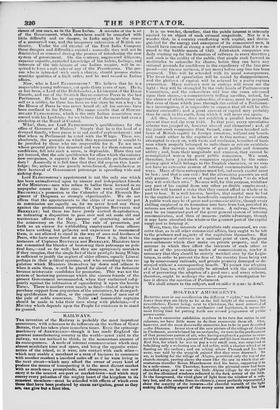RAILWAYS.
THE invention of the Railway is probably the most important occurrence, with reference to its influence on the welfare of Gi eat Britain, that has taken place in modern times. Even the spinning- machinery of Aexwaloser—though it has made England the greatest manufacturing country in the world—must yield to the railway, we are inclined to think, in the momentous amount of its consequences. A mode of internal communication which may almost annihilate time and space, and bring the opposite extre- mities of the island, as it were, into contact with each other— which may enable a merchant or a man of business to commune with another resident a hundred miles off as if he were living in the next street—which may afford the owner of every kind of produce the means of transporting it to the most distant market with as much ease, promptitude, and cheapness, as he can now carry it to the nearest sea-port or market-town—and which may convey every pulsation of the mighty heart of the kingdom to its remotest members—must be attended with effects of which even those that have been produced by steam navigation, great as they are, can give but a faint idea. It is no wonder, therefore, that the public interest is intensely excited by an object of such colossal magnitude. Nor is it a wonder that, in a country overflowing with capital, and distin- guished for the energy and enterprise of its commercial men, it should have roused so strong a spirit of speculation that it is c >m- pared to the bubble mania of 1825. Joint-stock companies are daily starting up for the formation of railways in every direction ; and such is the avidity of the public, that people rush forward in multitudes to subscribe for shares, before they can have any rational grounds for confidence in the expediency of the line pro- posed—nay (in one instance, if not more) before any line has been proposed. This will be attended with its usual consequences. The fever-heat of speculation will be cooled by disappointment, and the plethora of capital will be relieved by a pretty copious evacuation. Many railways now in embryo will never see the light : they will be strangled by the rude hands of Parliamentary Committees, and the subscribers will lose the sums advanced upon their shares,—a comparatively trifling sacrifice, indeed, for the chance of whieh every subscriber. of course, must be prepared. But even of those which pass through the ordeal of a Parliamen- tary investigation, it is impoisible to suppose that all will be ulti- mately successful ; and a great amount of capital may probably thus be sunk in the earth, from which it will never rise again.
All this, however, does not establish a parallel between the- present time and the year 1825. In that year, every speculative• scheme was jumped at, however absurd and chimerical ; and, of the joint-stock companies then formed, some have lavished mil- lions of British capital in foreign countries, without any benefi- cial result either to the capitalist or to this nation; and others attempted to carry on, with waste and confusion, branches of busi- ness which properly belonged to individuals or private establish- ments. But railways are objects of great public and domestic utility ; and, from their magnitude and expense, they cannot be accomplished unless by great public companies. We must, therefore, have joint-stock companies supported by the enter- prising spirit which belongs to the English character, or we can- not have an extensive system of internal communication by rail- ways. Many of these enterprises must fail, and much capital must
be lost ; and that is one evil : but the alternative presents an evil still greater. The owners of capital are at liberty " to do what they will with their own." No man will, for this purpose, withdraw any part of his capital from any other profitable employment; and few will hazard a stake that they cannot afford in whole or in part to lose. It is well known, besides, that capital may be lust to the capitalist and yet be beneficially employed for the country. A public work may be of great and permanent utility, though every shilling emplmed in its formation may have been lost, provided its returns are sufficient to keep it in action. A railway, therefore,. may be an important part of the great general system of internal communication, and thus of immens.t public advantage, though it may have absorbed the whole or the greatest part of the capital employed in forming it.
Were, then, time interests of capitalists only concerned, we con- ceive that, as in all other commercial affairs, they ought to be left to the prudence and sagacity of the capitalists themselves. But the importance of railways in a national point of view, the great encroachments which they make on private property, and the manner in which they affect the interests of each other as well as of the pre-existing; modes of communication, render it necessary that they should be strictly watched over by the Legis- lature, in order to prevent the face of the country from being cut up by unnecessary railroads, and private property damaged or de- stroyed without a corresponding benefit. To permit the adoptioa of a had line, too, will generally be attended with the additional evil of preventing the adoption of a good one; and every scheme, therefore, ought. to undergo the most rigorous investigation be- fore it obtain the sanction of Parliament. • We shall return to the subject, and coasider it more in detail.


























 Previous page
Previous page